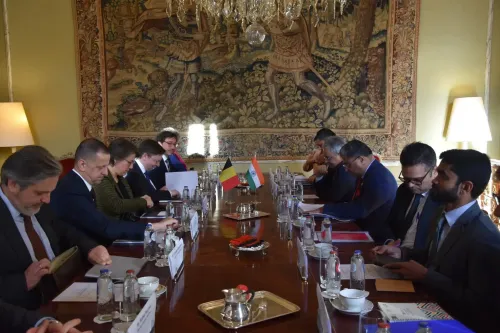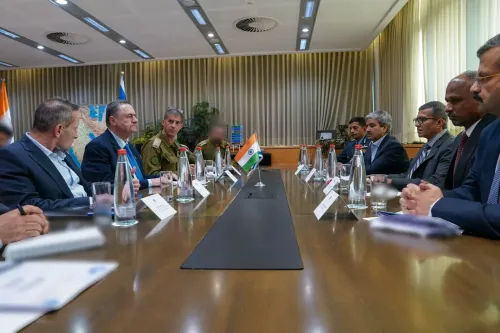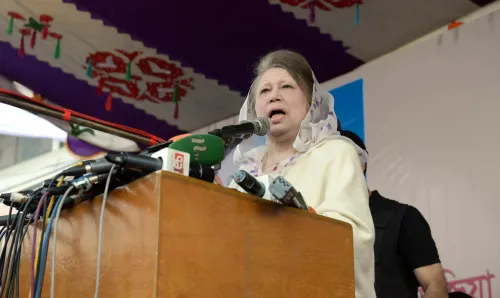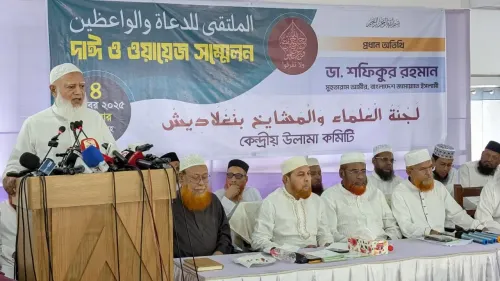Balochistan: A Deep Dive into the Crisis of Enforced Disappearances (IANS Review)
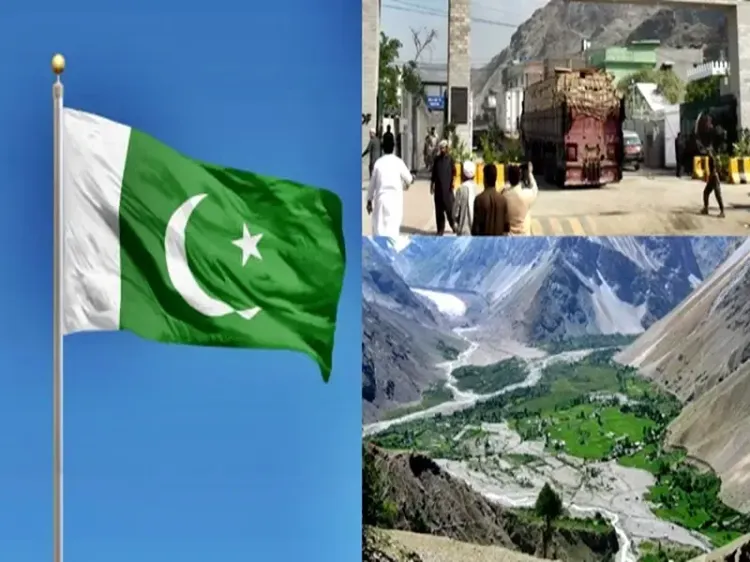
New Delhi, Dec 19 (NationPress) Enforced disappearances in Balochistan have escalated into one of the most critical human rights challenges in the area, particularly in the last twenty years. These cases predominantly involve Baloch activists, intellectuals, and individuals associated with nationalist organizations who are abducted by state security personnel or unidentified armed factions.
Many of these victims are detained without charges, leaving their families trapped in uncertainty about their loved ones' fates. Although this issue has attracted international scrutiny, attempts to bring the perpetrators to justice have largely been unsuccessful.
To fully understand the gravity of this crisis, it is essential to examine its historical background, the actors involved, the social implications, and the legal and political hurdles present. Balochistan, which is partitioned among Pakistan, Iran, and Afghanistan, has been a longstanding center of political turmoil and ethnic discord.
The Baloch population has historically felt marginalized by the central authorities of these nations, especially after the formation of Pakistan in 1947. Despite Balochistan's rich array of natural resources—including gas, minerals, and a strategically significant coastline—its people continue to assert that they are deprived of a just share of the region's wealth.
Over the years, movements advocating for Baloch nationalism have sought increased autonomy or outright independence, resulting in violent confrontations with the Pakistani state, which perceives these movements as threats to national integrity and security.
The recent uptick in enforced disappearances within Balochistan can be traced back to heightened military operations in the region in the early 2000s. These initiatives, aimed at quelling groups like the Baloch Liberation Army (BLA), Baloch Republican Army (BRA), and Baloch Liberation Front (BLF), often target suspected separatists, political dissenters, and civilians.
Pakistani authorities, especially the military and intelligence services, routinely deny involvement in these disappearances, frequently labelling the victims as militants or terrorists.
However, human rights organizations, both local and international, accuse the Pakistani government of orchestrating these abductions to quash political dissent and instill fear among the Baloch populace.
Obtaining accurate data on enforced disappearances is challenging due to underreporting and fears of retaliation.
Nevertheless, organizations like the Voice for Baloch Missing Persons (VBMP) and the Human Rights Commission of Pakistan (HRCP) have recorded a disturbing number of disappearances over the years.
Estimates suggest that between 2001 and 2023, over 2,000 individuals have gone missing. This figure includes activists, students, journalists, and ordinary citizens taken by security forces.
The real number is likely higher, as many families are too afraid to report disappearances, and several cases remain unregistered.
The abduction of Baloch activists has become a widespread tactic employed by the Pakistani military and intelligence agencies, including the Inter-Services Intelligence (ISI) and the Frontier Corps (FC).
These agencies often act with impunity, as numerous disappearances occur in regions with little media coverage, and victims are seldom brought before a judicial body. The families of the disappeared are left with no answers, facing limited avenues for seeking justice.
In certain instances, individuals reappear after months or even years, often showing signs of torture and severe emotional distress, while many victims never return. These acts of enforced disappearance are not only unlawful but also represent serious violations of international human rights law.
Conversely, Baloch separatist factions are also implicated in forced disappearances, though to a lesser degree. These groups often target individuals suspected of collaborating with the Pakistani state or military.
In such situations, the abducted individuals are accused of providing intelligence to authorities or supporting the military's presence in Balochistan.
While these abductions could be perceived as acts of resistance against state oppression, they have faced significant criticism for their indiscriminate nature, often ensnaring innocent civilians.
The actions of Baloch militant groups further contribute to the prevailing climate of fear and instability in the region. The state's justifications for these disappearances are based on the need to maintain national security and combat terrorism.
Pakistani officials argue that Baloch insurgent factions are engaged in violent separatist activities, claiming that extreme measures, including enforced disappearances, are necessary to restore order.
They view these disappearances as part of larger counterinsurgency efforts aimed at dismantling separatist networks. Nonetheless, this rationale is vehemently contested by human rights organizations, which assert that such actions are meant to silence dissent and crush any political opposition.
The international community has increasingly expressed concerns about the ongoing human rights abuses in Balochistan.
Human rights organizations such as Amnesty International and Human Rights Watch have consistently condemned the actions of the Pakistani government, demanding an end to enforced disappearances and accountability for those responsible.
Despite this, global pressure has had limited impact in effecting substantial change on the ground. The Pakistani government has persistently rejected external intervention, framing it as an infringement on the nation’s sovereignty.
Moreover, Pakistan has yet to ratify the International Convention for the Protection of All Persons from Enforced Disappearance, which took effect in 2011. As a result, there is no binding legal framework to hold the government accountable for these violations.
The social consequences of these disappearances have been profound. Families of the disappeared often endure prolonged uncertainty and trauma, as the absence of a loved one becomes a form of psychological torment, leaving them without clarity regarding their fate.
In some cases, families endure additional suffering due to stigma, as the Pakistani state frequently brands them as “traitors” or “terrorists” solely based on their association with the disappeared.
This stigmatization complicates their quest for justice, as they are often ostracized by their communities or subjected to harassment by state authorities. Furthermore, the pervasive fear of abduction has created a chilling effect on political activism and public dissent in Balochistan.
Many potential activists or critics of the government are silenced not just through force but also through fear. This atmosphere stifles the development of a vibrant political discourse and prevents the Baloch people from peacefully voicing their grievances.
The suppression of political freedoms has also led to the displacement of numerous Baloch individuals, with many fleeing to neighboring Afghanistan or seeking asylum in other nations.
Despite these challenges, efforts have been initiated at both local and international levels to address the matter of enforced disappearances. Local organizations, such as the Voice for Baloch Missing Persons, continue to raise awareness of the crisis through protests and campaigns, both within Balochistan and on the international stage.
International human rights organizations have also called for heightened attention to the issue, urging the Pakistani government to respect the rights of its citizens and investigate all instances of enforced disappearances.
However, substantial progress remains elusive. Although the Pakistani government has created bodies like the Commission of Inquiry on Enforced Disappearances (COIED), these commissions are often criticized for their lack of independence and effectiveness.
Critics contend that these bodies serve merely as symbolic gestures, designed to placate international concerns without addressing the root causes of the problem.
The legal framework surrounding enforced disappearances in Pakistan is inadequate. While the Constitution guarantees fundamental human rights, these rights are frequently breached in Balochistan.
The Pakistani state has yet to implement comprehensive reforms that would protect its citizens from enforced disappearances, and without such reforms, the cycle of abductions and violence is likely to continue.
For improvements to occur, there must be a stronger political will from the Pakistani government to engage in meaningful dialogue with Baloch nationalist groups and meet their demands for greater autonomy and control over their natural resources.
Additionally, Pakistan must take concrete steps to hold accountable those responsible for enforced disappearances, whether they are members of the military, intelligence agencies, or other state actors. International pressure and support for human rights organizations will also be vital in urging the Pakistani government toward reform.
Until these measures are put in place, Balochistan will remain a region characterized by widespread human rights violations, with its citizens living in constant fear of abduction, oppression, and violence.
The Pakistan Army, often backed by intelligence agencies like the ISI, has been extensively implicated in orchestrating these enforced disappearances as part of its counterinsurgency strategies against Baloch nationalist movements.
These actions, conducted under the guise of national security, have resulted in thousands of Baloch citizens being abducted, tortured, and in many instances, permanently disappeared.
The ultimate solution lies in acknowledging the rights of the Baloch people, ceasing state-sanctioned abductions, and restoring political and social freedoms in the region. Holding the Pakistan Army and intelligence agencies accountable for their roles in these violations is essential to breaking the cycle of impunity.
Until then, Balochistan will endure as a place of suffering, where the voices of the disappeared and their families remain unheard, and their quest for justice continues to be elusive.

